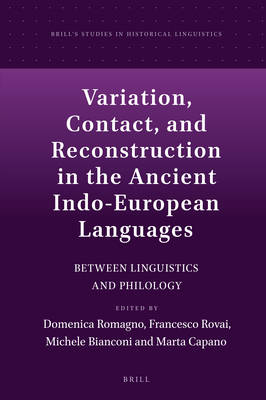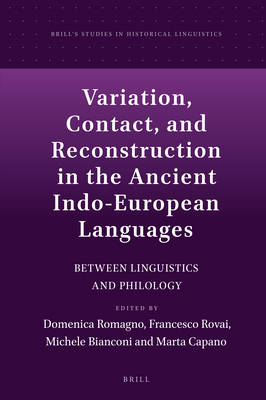
- Afhalen na 1 uur in een winkel met voorraad
- Gratis thuislevering in België vanaf € 30
- Ruim aanbod met 7 miljoen producten
- Afhalen na 1 uur in een winkel met voorraad
- Gratis thuislevering in België vanaf € 30
- Ruim aanbod met 7 miljoen producten
Zoeken
Variation, Contact, and Reconstruction in the Ancient Indo-European Languages
Between Linguistics and Philology
€ 286,95
+ 573 punten
Omschrijving
The collected papers in this book address an array of important issues in the field of Historical Linguistics and, specifically, Indo-European Linguistics, including different theoretical approaches and innovative methodologies for studying language organization and change, building on the strict relationship between Linguistics and Philology. The papers provide significant contributions to the understanding of aspects of variation, contact and reconstruction, reflect a wide range of perspectives, and focus on issues and data from a large variety of languages. The themes that emerge from the papers center around two main research lines: 1. the relationship between language facts and historical accidents; 2. the relationship between grammatical categories and conceptual representations. The book is of interest for any reader seeking to gain insight into the nature of language organization and change.
Specificaties
Betrokkenen
- Uitgeverij:
Inhoud
- Aantal bladzijden:
- 360
- Taal:
- Engels
- Reeks:
- Reeksnummer:
- nr. 17
Eigenschappen
- Productcode (EAN):
- 9789004508859
- Verschijningsdatum:
- 19/05/2022
- Uitvoering:
- Hardcover
- Formaat:
- Genaaid
- Afmetingen:
- 155 mm x 235 mm
- Gewicht:
- 721 g

Alleen bij Standaard Boekhandel
+ 573 punten op je klantenkaart van Standaard Boekhandel
Beoordelingen
We publiceren alleen reviews die voldoen aan de voorwaarden voor reviews. Bekijk onze voorwaarden voor reviews.







